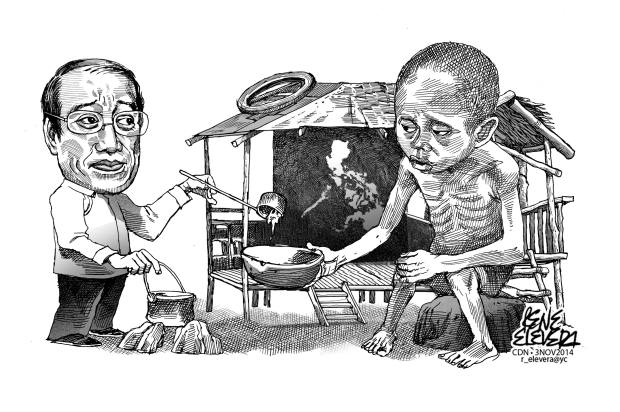As disturbing as the statistics she presented, Sen. Grace Poe’s disclosure that there are 15 million hungry children in the country may sound like old news for the Philippines, which has been trying to get out of poverty for ages.
News photos of children sleeping on pavements may tug at the heart strings or draw outrage but since when has the national government’s anti-poverty programs really eradicated the problem?
The number itself, 15 million, shows that poverty may have at best slowed down 2) stayed the same or 3) actually gotten worse.
This is worrisome because the level of spending for the conditional cash transfer program also known as the 4 P’s or Pantawaid Pamilyang Pilipino, which targets “extremely poor” families with kids up to 14 years old , has been rising every year. For this year the budget is about P62 billion.
The program carried out by the social welfare department was designed to reach 4.3 million desperate households. Why has this not made a dent in poverty levels on a national scale?
Respected pollsters like Mahar Mangahas of the Social Weather Station don’t sugarcoat the picture. There’s economic growth, he says, but there’s a big disconnect with the poor. They don’t feel it.
Reviewing statistics of self-rated poverty and hunger levels nationwide in the last two quarters of 2014, Mangahas asked why ratings fluctuate instead of dropping steadily, given the various government interventions.
“Why does the vaunted rapid economic growth not trickle down to the poor and hungry?… One thing is definite: The GNP and its rate of growth are practically irrelevant as determinants of the levels of poverty and hunger,” he said.
Poe’s message is a reflection of her late father’s simple but accurate assessment of the country’s main problem – most families can’t put food on the table for their children three times a day.
Instead of dwelling on the political color of the message, we should consider what the government had been doing wrong in its strategy or what it needs to do more of to minimize poverty.
Rather than just being a lifeline, the dole outs may have encouraged poor Filipinos to become dependent on government. Or this may be a case of too little help for too many in need.
The Cebu city government has taken this populist approach but has to think carefully about its priorities. Extending cash aid to illegal settlers on one hand, then allocating P12 million for single indigent parents doesn’t stem from a coherent or wholistic urban development plan. Yolanda was the wake-up call to build self-reliance. We hope City Hall stops enacting new laws that would extend the doleout setup to other underprivileged sectors.
It should focus instead on laws and programs that empower them to earn a decent livelihood.
Disclaimer: The comments uploaded on this site do not necessarily represent or reflect the views of management and owner of Cebudailynews. We reserve the right to exclude comments that we deem to be inconsistent with our editorial standards.





